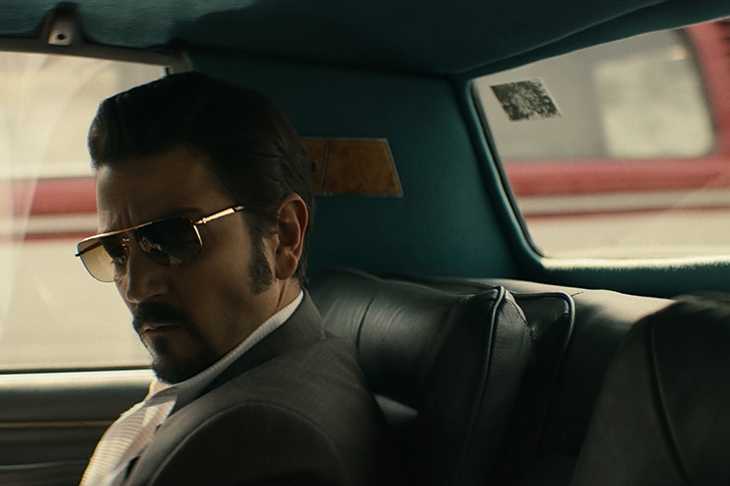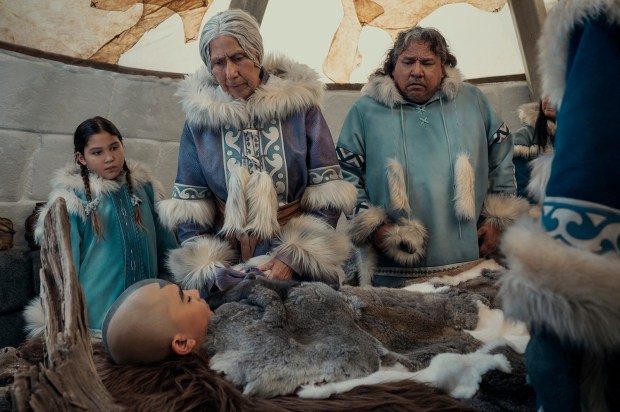Ever since the end of Gomorrah season four (Sky Atlantic) I have been bereft. I eked it out for as long as I could, going whole weeks without watching an episode — rationing it and savouring it as you do when you’re down to your last Rolo. But eventually I could put off the climax no longer, I watched them all die — as everyone always does in Gomorrah, so I’m not spoiling anything — and now I’m on the hunt for a substitute.
So far the most obvious candidate is Narcos: Mexico season two (Netflix). This contains most of the same key ingredients: bling, convoys of vehicles ripe for ambush, drugs shipments, betrayal, tense stand-offs that could end up either in extreme violence or a cunning, game-changing new arrangement, torture, etc. But it does suffer from one major flaw which you keep having mentally to edit out to stop it becoming too annoying: the wretched bloody voiceover.
It belongs to a Drugs Enforcement Administration (DEA) agent, whose cool, world-weary, insinuating drawl invites you to believe that this is another true-life cops and criminals procedural about bad guys being tracked down and outwitted and eventually getting their just deserts from good ol’ US law enforcement. But actually, as a viewer you’re really not that interested in the angry, vengeful, bitter, scruffy, boring, worthy, undifferentiable DEA agents and their petty schemings. Your heart is with the more glamorous drugs kingpins — in the first two Narcos series, with Pablo Escobar; in the two Mexico spin-offs with Felix Gallardo.
As the Narcos franchise draws closer to the present, I can see that it might become increasingly hard to find common cause with baddies so psychopathically evil that, these days, they seem to torture, massacre and behead at the drop of a hat. (In 2017, one of the series location managers was found shot dead on a dirt road, having apparently aroused suspicion by taking photographs.) But with this season, we’re still in the relatively benign and innocent 1980s (era of what would become the Iran-Contra scandal) and drugs bosses — slick, quick-witted Gallardo, certainly — seem more heroic than transgressive.
Gallardo (Diego Luna) ended season one — spoiler alert — having built a spectacular empire first with sinsemilla marijuana, later with cocaine, only to be reduced almost to nothing, his best men killed or captured, his business collapsing, the implacable DEA determined to destroy him for having murdered one of their undercover agents. This, though, makes him the underdog — not unlike Genny Savastano, clawing his way back under similar circumstances in Gomorrah — and when he throws his lavish ‘I’m back’ party in one of those atmospheric, extended set-piece sequences Narcos does so well, he becomes your Michael Corleone. You don’t much mind what terrible things he needs to do, so long as he gets on and does them — because he’s your guy.
In many ways, the appeal of Narcos — as with Suburra, Gomorrah, Top Boy and all those other drugs series I love and recommend, though not The Wire, that’s dull — is much the same as that of Game of Thrones or Succession: elemental power struggles, conducted by larger-than-life characters, who triumph by thinking more deviously and owning bigger balls than their soon-to-be-crushed-and-humiliated rivals.
That’s why you’re happy to have Gallardo representing you, despite his ruthlessness, despite his appalling misjudgment — as happened in real life — of having killed that DEA agent. Faced with impossible prospects — the Cali cartel, the Mexican state, the Yanks, even his old friends, all anxious to cut loose from him or destroy him — our Felix is always two steps ahead and simply doubles down with a new plan of such breathtaking ambition no one else could ever have dreamt of it, which is why he is the Boss.
Still, Narcos is not quite in Gomorrah’s league. It lacks such an extensive cast of well-drawn, recognisable characters — half the time with Narcos, you’re really not sure who is who or what is going on — and rather too often the scriptwriters deploy that clunky TV trope I’ll call false jeopardy. So, for example, you might have one of the Mexicans hit on the brilliant idea of digging a tunnel under the border to evade US customs. In real life, this probably went something like: great idea; bosh! But in Narcos: Mexico, we have to sit through endless tedious scenes of contrived tension where other characters suck their teeth, shake their heads, and ruminate over what a disastrously misconceived notion this is.
I felt the same way when Felix is on the plane about to outline his ingenious scheme to the CIA. The rigmarole beforehand, where it seems they are about to arrest him, strikes a false note. I accept that these mood swings are a TV drama convention, but Narcos does it too often, like it’s one of the rules all US screenwriters learned at script school and aren’t allowed to break. It’s why foreign-language series such as Gomorrah (Italian, set in Naples) will always tend to have the edge. They’re not quite so bound by convention.
Got something to add? Join the discussion and comment below.
Get 10 issues for just $10
Subscribe to The Spectator Australia today for the next 10 magazine issues, plus full online access, for just $10.
You might disagree with half of it, but you’ll enjoy reading all of it. Try your first month for free, then just $2 a week for the remainder of your first year.















Comments
Don't miss out
Join the conversation with other Spectator Australia readers. Subscribe to leave a comment.
SUBSCRIBEAlready a subscriber? Log in